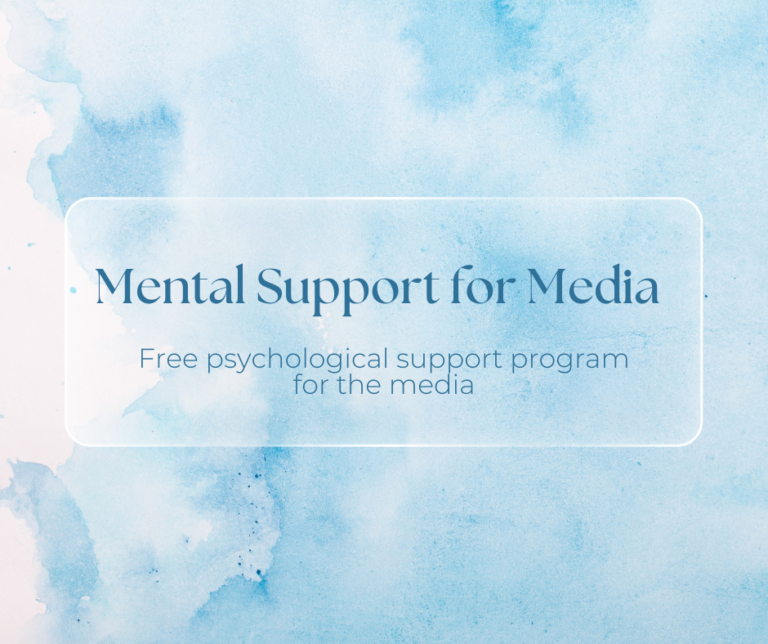During the examination of the psychological state of journalists, we take into account the specifics of their professional challenges, as well as the challenges faced by anyone living and working in conditions of war. Global research [1] indicates that journalism is one of those professions with a high risk of professional burnout. This is associated with both the nature of the work and the peculiarities of the newsroom processes.
Other studies suggest that being in a war zone, whether as a military personnel or a civilian, significantly increases the frequency of anxiety disorders, depression, post-traumatic stress disorder, and substance abuse [Pizzaro, 2006; Eytan, 2011; Heidenreich, 2009; Wilson, 2004; Krippner, 2003].
Journalists, especially at the beginning of a conflict, face an exceptionally challenging task: despite all the challenges, they must not only remain resilient but also take care of the emotions and well-being of both the subjects they cover and their audience/readers.
What has changed after the full-scale invasion by Russia?
We have adapted to this new reality of war to some extent. Unfortunately, we know what it’s like to live with the constant sound of alarms, to hear explosions, and to encounter daily reports of casualties and destruction, or to cover painful and tragic stories. However, because we have this ongoing situation, the intensity of our emotions and reactions has diminished. Journalists, like Ukrainians in general, have learned to cope with many challenges and have become more resilient to various stressors.
Nevertheless, since there is no respite or weekends in war, exhaustion continues to accumulate – a fatigue that doesn’t go away even after brief breaks. Often, this exhaustion becomes the starting point for the development of other problems.
Working in journalism entails additional risks associated with both direct and indirect exposure to trauma. However, purposefulness, activity, focus on the goal, and a clear sense of one’s role during wartime can serve as “protective” factors against the negative consequences of war. We are aware that journalists help people regain control and overcome their helplessness by providing access to information. They accompany individuals in expressing their life stories, thereby processing traumatic memories. Journalists also gather evidence of crimes to ensure that those responsible are held accountable. They assist in creating “informational memorials” for those who have died, etching their memory in the minds of others. The role of journalists in these aspects is invaluable.
Therefore, there exists a certain paradox in the work of a journalist: journalism is simultaneously a protective factor and a risk factor. On one hand, the sense of purpose, importance, a certain mission in the work, and its significance for a wide range of individuals strengthen resilience. On the other hand, journalism is typically associated with proximity to traumatic events, painful emotions, the continuous flow of information, which increases the risk of both burnout and mental health issues.
The profession of a journalist is extremely important, but behind the profession is a person who is equally important and sometimes in need of support.
About the conditions that journalists may experience
Within the Mental Support for Media program initiated by Souspilnist Foundation and the BrainCult mental health center, a diagnostic assessment of the mental health of members of several newsrooms was conducted. Standardized screening questionnaires were used, and based on the responses of 79 journalists, the following data were observed:
– Initial signs of burnout are present in nearly 47% of participants, and severe burnout is reported by 43%. This means that over 90% of the journalists exhibit symptoms of burnout.
– Even more individuals exhibit symptoms of depression – 97%: with mild symptoms reported by 34% of participants and severe symptoms by 63%.
– Symptoms of moderate anxiety disorder are experienced by 44% of the participants, with severe symptoms reported by 50.5%.
38% of those who have experienced a traumatic event, as indicated in the survey, have painful memories that involuntarily (i.e., without their own will or desire) and regularly resurface in their memory. This is one of the indicators of possible post-traumatic stress – flashbacks, a feeling that the event is happening again, vivid emotional memories that are unwanted, or even nightmares.
Even if we consider a potential bias in the survey due to the possibility that those interested in the support program participated, as they may be facing difficulties, the figures are still extremely high and require attention.
It’s important to understand that during times of war, people can experience a wide range and intensity of emotions and physiological reactions in response to violent actions. These reactions can be unpleasant, difficult to control, and challenging to comprehend. However, they are usually the result of the human body’s self-defense mechanisms in response to threats. These states can be complex and require attention, but they are not inherently pathological.
Alongside the survey results we mentioned earlier, we also have another perspective: Ukrainian journalists demonstrate remarkable resilience during the most significant challenges. In assessing their ability to withstand stress (which is a protective response to counter feelings of helplessness), 45.5% of respondents answered, “often and quite often” to the question “How often in the last month have you felt confident that you can cope with solving your personal problems?” Conversely, only 4.5% responded with “never and almost never.” This suggests that many Ukrainian journalists exhibit a strong sense of confidence and resilience in the face of adversity.
So, it’s entirely normal if you or your journalist colleagues occasionally feel sad, nervous, irritated, confused, or hopeless in certain situations or at certain times. It’s also quite common to experience episodic disruptions in sleep and minor issues with concentration or memory. There may be days when you feel a sense of complete hopelessness, which is completely normal during wartime.
However, it’s important to monitor the duration of these days and states. If they persist for more than two weeks (for symptoms of depression) or more than six months (for symptoms of anxiety disorder), or if they significantly interfere with daily functioning, it’s a reason to consider seeking help and addressing these psychological difficulties. This is not a situation that should be accepted as the norm or as a typical “side effect” of the profession, and it should not be ignored or tolerated.
What needs to be considered when evaluating your own state?
We recommend using markers to assess your mental state, focusing on the most common conditions: burnout, depression, and anxiety disorders.
We have detailed what professional burnout is and how to deal with it on a personal level, as well as at the newsroom level, in the previous recommendation (Recommendation No. 14: How journalists can overcome professional burnout and establish sources of support).
Let’s remind ourselves that it’s a psychological state associated with a sense of exhaustion (emotional, physical, and cognitive), loss of enthusiasm, as well as the development of a negative perception of one’s productivity or work in general, colleagues, or people with whom interaction occurs. It’s a systemic problem, and therefore, it requires systemic solutions that depend on various participants in the process: from leadership (newsrooms) to the team and the journalists themselves.
Symptoms of depression
Five (or more) of such symptoms persist for a period of two weeks or longer, for most of the day, nearly every day:
Depressed mood: The person themselves or other people say they feel sad, empty, or hopeless, or on the verge of crying.
Noticeable loss of interest, pleasure, or activity.
Significant weight loss or gain without intentional dieting (e.g. more than 5% within a month) or a change in appetite (increase or decrease).
Insomnia or excessive sleepiness.
Psychomotor agitation (restlessness) or retardation.
Fatigue or loss of energy.
Feelings of worthlessness or excessive guilt.
Difficulty in thinking or concentrating, or indecisiveness
Thoughts of death, recurring thoughts of suicide without a specific plan or with a plan.
Symptoms of Generalized Anxiety Disorder (GAD):
Excessive worry and apprehension (anxious anticipation) that are caused by various events or activities and persist for most days for at least six months.
The individual finds it difficult to control these feelings.
Anxiety and distress associated with three (or more) of the following symptoms:
Restlessness, feeling easily irritated or nervous.
- Persistent fatigue.
- Difficulty concentrating or feeling “mind going blank.”
- Irritability.
- Muscle tension.
- Sleep disturbances (difficulty falling asleep or having shallow, restless, and unsatisfying sleep).
- Possible Options for Restoring and Strengthening the Resilience of Journalists
It is advisable to distinguish between two levels: the personal level and the newsroom (organizational) level.
Personal Level
When it comes to self-help strategies, the recommendations are basic and revolve around the need for a change in the “rhythm of life,” altering how you use and replenish your own energy and shifting your focus in expectations. These strategies work best when they become a part of your daily life, rather than something you only do “on weekends” or during vacations.
The key is to do simple things well rather than relying on overly complex formulas or miracle techniques.
Regularly replenish your energy for both your body and soul:
Get proper sleep (sleep is not a luxury; it is a biological necessity and the only way for your body to recover).
Maintain a balanced diet (even though your intestines and brain are located in different parts of your body, they are closely connected. Your brain requires a proper balance of gut bacteria to produce the necessary chemicals for maintaining its stable and healthy state. Therefore, it is essential to include foods in your diet that support these processes (see here for more details)).
Create opportunities to recharge your energy, find inspiration in people, nature, and art. This is not extravagance; it’s a way to keep your internal “battery” charged.
Always maintain a daily balance between work and rest.
Review your expectations and demands on yourself: evaluate how well your work responsibilities align with your current capabilities, ensure there is a life space “outside of work,” and find ways to increase satisfaction from your work (understand its purpose, celebrate successes, acquire new knowledge/skills, ensure your work environment is comfortable and pleasant, and actively build relationships with colleagues).
“Be part of your tribe” – seek support when things get tough, offer it to others, and learn how to be a friend to yourself, providing self-support.
Learn and practice emotional self-regulation techniques.
Take care of your “protective armor” – be aware of the specifics of working with traumatic content and not just know but also adhere to recommendations.
Newsroom Level
The organizational context has a significant impact on how well people work and how effectively they cope with life and work challenges. To ensure high-quality journalism, newsrooms should focus on becoming a hub for psychosocial support for their staff.
As an option, consider providing comprehensive psychological support to the team, which, among other things, is offered within the Mental Support for Media program and includes four components:
- Periodic diagnosis of the team’s psychological state.
- Conducting psychoeducational activities to develop self-help and mutual assistance skills within the team; training to enhance journalistic competencies with a focus on sensitivity.
- Access to individual consultations with mental health professionals.
- Organizing recovery events for the team.
Various stressors require different strategies, but effective psychosocial support in the context of war should aim to address a wide range of challenges. Below are highlighted key needs that respond to common challenges faced by journalists based on the survey results.
Replenishing energy, recovery
“I feel just as tired on Monday evening as at the end of the workweek.”
“I’m troubled by insomnia and headaches.”
“It has become difficult for me to complete the tasks I’ve started.”
– Organizing training on sleep hygiene, muscle relaxation, and mental well-being.
– Vacations (do employees have real vacations when they can take a break and be off work completely?).
– Encouraging employees to take lunch breaks without work, ideally away from their workplaces.
– Encouraging physical activity and providing opportunities for it in the workplace.
– Maintaining a balance: do employees have time without work?
– Cultivating traditions for celebrating birthdays and other shared holidays.
– Creating opportunities for social breaks: “break points” with water coolers, coffee/snacks where employees can cross paths and take a break with a beverage.
– Providing additional time for travel during business trips and ensuring accommodation conditions that promote recovery.
– Organizing regular recovery events, preferably close to nature.
Safety, anxiety reduction
“The uncertainty of the future scares me.”
“Constant worry and anxiety that I can’t stop or control.”
– Creating “islands of certainty” at work: clear work schedules, clarity in payment of remuneration.
– Providing access to a journalist insurance fund (including the one established and supported by Souspilnist Foundation).
– Ensuring equipment and training that meet the needs of physical safety.
– Accessible information on who to contact for what (document).
– Articulation from leaders that “I am available.”
– Organizing discussions about how the mind and body react to stress related to the war.
– Discussing secondary trauma and how remote viewing of images and interviews can affect journalists.
– Training in sensitive journalism skills: interviewing trauma survivors and other vulnerable groups.
Sense of purpose and significance
“I started doubting my professional abilities.”
“Negative feelings about yourself – feeling like a failure or letting yourself or your family down.”
A sense of purpose is a key element of resilience in the context of the profession:
– Emphasizing the significance of each individual’s contribution (acknowledge the team’s successes, recognize the achievements of specific team members).
– Defining the team’s mission and motto (display them prominently; repeat them during meetings).
– Providing perks and tokens of appreciation for employees.
Normalization, acceptance, and support
“After experiencing a traumatic event, memories of it disturb me, and sometimes these memories (or dreams about the event) repeat, causing distress, and are unwanted.”
— Creating a culture of awareness about mental disorders, normalizing reactions in the context of work, normalizing requests for support – conducting webinars, information posters about prevalence, symptoms, and what to do, contact information for seeking help.
— Sharing, telling about one’s own experiences – those who have benefited from psychotherapy or consultations with professionals.
— Being attentive to those returning from difficult assignments – “How are you? Do you want to talk?”
— Rotating the responsibility for covering difficult events (not having one person covering difficult events all the time; there should be breaks in this work).
Timely meeting these important practical needs is crucial in providing genuine and effective psychological support.
Mental health is one of the foundations for ensuring quality journalism, and caring for it should become the norm at both the individual and newsroom levels. Therefore, it is important to maintain a permanent focus on creating an atmosphere and the newsroom corporate policy that is oriented towards the psychological well-being of employees.
The recommendation for the Independent Media Council was prepared by:
Anastasiia Nizhnik, psychotherapist, consultant, co-founder of the BrainCult mental health center and the Resilience Hub platform;
Andrii Sydorenko, coordinator of mental health programs for journalists at Souspilnist Foundation, co-founder of the Resilience Hub.
1. Center for Innovation and Sustainability in Local Media: https://www.cislm.org/research/burnout-report/
The International Center for Journalists (ICFJ):
Journalism Practice, Volume 3, 2009: https://www.tandfonline.com/doi/abs/10.1080/17512780902798653
European Journal of Work and Organizational Psychology, Volume 25, 2016 – Issue 5:
https://www.tandfonline.com/doi/abs/10.1080/1359432X.2015.1114470?journalCode=pewo20
Newspaper journalism in crisis: Burnout on the rise, eroding young journalists’ career commitment: https://www.researchgate.net/publication/254121300_Newspaper_journalism_in_crisis_Burnout_on_the_rise_eroding_young_journalists’_career_commitment


